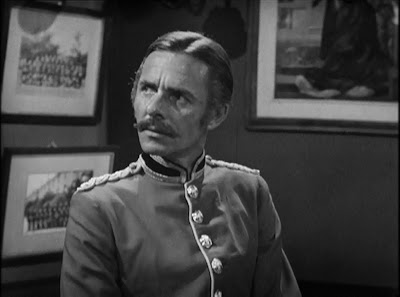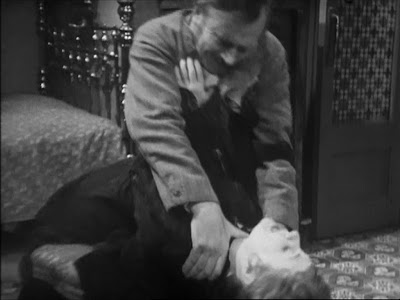It occurs to me that it's ages since I've mentioned the real life news events beyond the tellybox that have been taking place in Britain in 1963. So, in the unlikely event anyone's missed that particular feature of TV Minus 50, tonight's viewing is broadcast to a Britain in which Stephen Ward and Christine Keeler have both been sent to prison, Kim Philby's been revealed as the Third Man, the test ban treaty's been signed by the UK, the US and Russia, and the Great Train Robbery's taken place. Meanwhile, Pedigree Toys are preparing to introduce the British public to Sindy, their sulky-faced answer to the American Barbie doll.
Anyway, that's enough of the 1960s, time to head back to the 1880s.
The second episode in a row penned by series creator Ted Willis (this time from a story by Bill McIlwraith), tonight's Sergeant Cork initially feels like a companion piece to last week's The Case of the Sleeping Coachman, attacking callous employers and the army with the same fervour as that episode did the landed gentry. However, it soon finds its own tangent to head off on.
A strike is in progress at the factory owned by the draconian Mr Robinson (Neal Arden) and his more easy-going partners Mr Clarence (Brian Badcoe) and Mr Cook (Tom Macaulay). The workers are massed outside the factory gates, clamouring for a pay increase.
Robinson takes the inflammatory step of calling in the army to deal with the strikers. Clarence predicts it will end in disaster and he's not wrong: a man is shot, his body falling on a soldier's rifle...
Much to the disgust of Inspector Bird, who loves nothing more than cosying up to the rich and powerful, Sergeant Cork's chosen to investigate the death, due to him possessing the rare quality of not antagonising the working class. Was the man shot as a horrible accident in the course of the army trying to keep order (the official line), or is there more going on?
Cork immediately finds his investigation impeded by army bureaucracy, embodied in the form of the supercilious Major Edwards (Basil Henson). "What incident?" Edwards asks, confused, when Cork comes to see him about the shooting: the death of an "agitator" is to him entirely unworthy of comment.
It's great fun to once again see Cork walk all over an intractable opponent, contempt concealed beneath his twinkly exterior, though the confrontation with the major's essentially just a replay of his interview with the irascible Sir Henry last week. Despite being frustratingly uncooperative, Edwards does reveal an interesting piece of information: when the shooting took place, Robinson had left the office in order to come and congratulate the Major on the job his men were doing. The Major enthuses about the factory owner:"The sort of fellow who loves a good scrap." "Yes," Cork sardonically replies, "Especially if the other lot aren't armed." Cork and Marriott have great fun making off with the rifle against the apopleptic Major's wishes.
Next stop is the dead man's home. Cork offers his commiserations to the widow, Ivy Strong (Jane Wenham), but finds her already being comforted by her late husband's brother Alf (John Boyd-Brent). The relationship between the pair seems almost suspiciously close.
The late Mr Strong was a union organiser, which Cork suspects may be related to his death. At the Strong residence he also gets to meet union chief Ned Fisher (Charles Morgan). "By all accounts, you're not so bad," the gruff, beardy chap grudgingly acknowledges of the Sergeant.
Marriott, meanwhile, is grilling the factory bosses. Clarence and Cook seem more than happy to apportion any blame that's going to Robinson, who indeed proves a deeply unpleasant character. "You've got a damned impertinence discussing me behind my back," he growls on finding Marriott chatting to his partners. "Well, now I can ask you to your face," Bob winningly responds. Robinson makes no secret of his hatred for Strong, and in the episode's comic highlight claims he's never wished anyone dead, only to be countered by a childlike "Ooh, that's not what you said!" from the excitable Mr Cook.
Cork finds an unexpected informant in a street sweeper (Douglas Ives), whose enthusiastic, toothless performance should bring a smile to any fans of Patsy Smart's turn as "Ghoul" in Doctor Who's The Talons of Weng-Chiang (Cork's subtle attempts to ward off the man's smell and projectile saliva are also hilarious). Despite firm denials from the factory owner, he confirms that Robinson was indeed outside at the time of the shooting. By this time, Cork's found out it was a shotgun, rather than the rifle, that ended the man's life, and Robinson's looking like an increasingly likely suspect
Marriott, accompanied by Alf Strong, goes to visit Peter Rowlands (Brian Tipping), another worker who was injured during the strike, and is now recovering in hospital. During the visit, we get an especially good look at a microphone as it descends into shot (and looks like it comes close to knocking John Boyd-Brent out).
Peter thinks it was he who shot Strong, falling on the gun after being shot himself. But he's clearly not quite in his right mind. It's always nice to see a nun, and there's an especially good one ministering to Peter.
While all this is going on, we learn that Alf and Ivy's relationship is indeed very close: he wants to marry her as soon as possible, but she insists he has to give up the union, which she's no time for. After another visit to Mrs Strong, Cork and Marriott are attacked by a gang of thugs led by Ned Fisher. They're no match for our wonderful policemen, of course, and Cork's able to extract some further information from Fisher: Strong had been having an affair with a toff. When Cork finds out that this was, in fact, Mrs Robinson, and that it's her husband's shotgun Strong was killed with, the case against the factory owner seems almost watertight.
But not quite. Ivy's dalliance with Mr Cook, who's offered her a position as his "housekeeper", makes Alf see red. In a murderous rage, he confesses to her that it was he who killed his brother, after stealing Robinson's gun, in order to get her for himself - and now it doesn't look like that's happening, she's next.
Cork turns up just in time to save Ivy and cart Alf off. Ivy's the star character of the episode, vividly brought to life by Jane Wenham - whose screen appearances were relatively few but include a memorable performance as the working class woman who falls victim to the callous middle class in the film version of An Inspector Calls (a pretty Cork-like narrative) - incidentally, she was also Albert Finney's first wife. As usual, though, the potential for a progressive female character's eventually wasted, with Ivy descending into hysteria after being saved, and suffering the humiliation of having a jug of water flung over her by Cork.
As my rather confused synopsis suggests, The Case of the Soldier's Rifle is an especially involved story, which regularly trips up our expectations. Comparing it to last week's fairly unambiguous political statement from Willis it's not quite as clear what the message is (if there is one) - though I'd guess it's all about personal squabbles among workers hampering the aims of organised labour. Or something like that.
Anyway, over to the world of popular music now. Billy J Kramer and the Dakotas are at number 1 in the hit parade with "Bad to Me", while a little way down the chart here's the stirring sound of Ken Thorne and his orchestra with the theme from The Legion's Last Patrol - the only thing this obscure Stewart Granger-starring Belgian/Spanish/Italian/German co-production is today remembered for.
















No comments:
Post a Comment